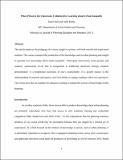When Prison Is the Classroom: Collaborative Learning about Urban Inequality
Author(s)
Steil, Justin P; Mehta, Aditi
DownloadAccepted version (171.7Kb)
Open Access Policy
Open Access Policy
Creative Commons Attribution-Noncommercial-Share Alike
Terms of use
Metadata
Show full item recordAbstract
This article analyzes the pedagogy of an urban sociology course taught in prison, with both outside and imprisoned students. The course examined the production of knowledge used in the field of planning and sought to facilitate the coproduction of new insights about urban inequality. Participant observation, focus groups, and students’ written reflections reveal that, in comparison to traditional classroom settings, students explored with greater complexity their embodiment of multiple social identities, wrestled more deeply with the structural embeddedness of individual agency, and situated their personal experiences in a broader theoretical narrative about urban inequality. Building trust in the face of significant power disparities within the classroom was essential to learning. The findings highlight the importance of new locations of learning that enable classrooms to become contact zones, pushing students to collaboratively reimagine justice in the city with those outside the traditional classroom.
Keywords: planning education; urban inequality; sociology of knowledge; prisons
Date issued
2017-10Department
Massachusetts Institute of Technology. Department of Urban Studies and PlanningJournal
Journal of Eduation Planning and Research
Publisher
SAGE Publications
Citation
Steil, Justin and Aditi Mehta. "When Prison Is the Classroom: Collaborative Learning about Urban Inequality." Journal of Eduation Planning and Research (October 2017): 1-10 © 2017 The Author(s)
Version: Author's final manuscript
ISSN
0739-456X
1552-6577